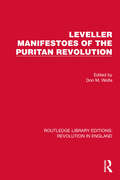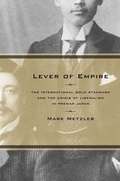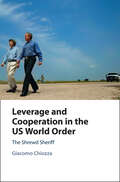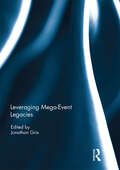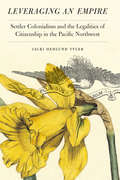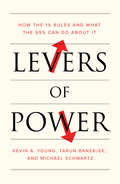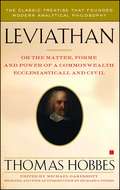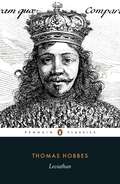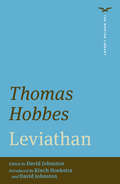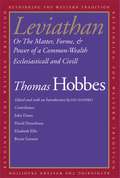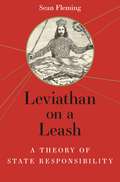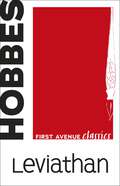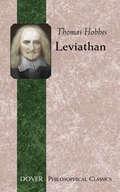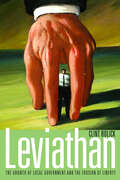- Table View
- List View
Leveller Manifestoes of the Puritan Revolution (Routledge Library Editions: Revolution in England #6)
by Don M. WolfeLeveller Manifestoes (1944) is a collection of primary manifestoes issued by the Levellers, the group which played an active and influential role in the English revolution of 1642–49. This book collects together rare pamphlets and tracts that are seldom available, and certainly not in one place for ease of research.
Levelling Up the UK Economy: The Need for Transformative Change
by Jonathan Wistow Luke TelfordThis book contributes to emerging debates about Levelling Up the UK Economy, considering these alongside the nature of, and trends in, both the political economy and spatial disparities. Drawing on a complex systems framing, the book pulls together a range of evidence to provide insights about the agenda from macro, meso and micro levels of analyses, including utilising qualitative data from a small scoping study with Directors of Regeneration across several ‘left behind’ places and 25 residents of ‘left behind’ Redcar & Cleveland in Teesside. The book outlines phases in capitalism’s development, particularly the shift from post-war capitalism to a post-industrial and neoliberal society and the implications for spatial inequalities. The 2022 Levelling Up White Paper is analysed alongside a focus on the role of local government relative to the agenda. The book offers an empirical case study of ‘left behind’ Redcar & Cleveland, exposing deindustrialisation, insecure employment, crime, anti-social behaviour and sentiments on a North South divide and Levelling Up. We suggest that only a transformative change in the political economy, including significant and sustained investment at different spatial levels, is likely to achieve the ambition to Level Up.
Lever of Empire: The International Gold Standard and the Crisis of Liberalism in Prewar Japan
by Mark MetzlerThis book is the first full account of prewar international money power in Japan, and a dramatically different reading of international monetary history from that given in hitherto European-centered accounts.
Leverage and Cooperation in the US World Order: The Shrewd Sheriff
by Giacomo ChiozzaSince the end of World War II, the United States has maintained a unique system of partnerships and alliances, known as the US world order. Within this order, it has sought both compliance from, and consensus with, its partners. Sometimes it has achieved both, sometimes one but not the other, and sometimes neither. What accounts for this variation in hegemonic leadership? Giacomo Chiozza suggests that the answer depends on the domestic political institutions that structure US relations with the incumbent leaders in the partner nations. Domestic political institutions that foster political successors and allow for regular and flexible channels of leadership turnover make it easier for the US to sustain friendly relations. However, unexpectedly, institutions that allow for regular and flexible channels of leadership turnover also create domestic political incentives that foster the attainment of better governance and more respect of human rights.
Leverage of the Weak: Labor and Environmental Movements in Taiwan and South Korea (Social Movements, Protest and Contention #42)
by Hwa-Jen LiuComparing Taiwan and South Korea strategically, Hwa-Jen Liu seeks an answer to a deceptively simple question: Why do social movements appear at different times in a nation&’s development?Despite their apparent resemblance—a colonial heritage, authoritarian rule, rapid industrialization, and structural similarities—Taiwan and South Korea were opposites in their experiences with two key social movements. South Korea followed a conventional capitalist route: labor movements challenged the system long before environmental movements did. In Taiwan, pro-environment struggles gained strength before labor activism. Liu argues that part of the explanation lies in an analysis of how movements advance their causes by utilizing different types of power. Whereas labor movements have the power of economic leverage, environmental movements depend on the power of ideology. Therefore, examining material factors versus ideational factors is crucial to understanding the successes (or failures) of social movements.Leverage of the Weak is a significant contribution to the literature on social movements, to the study of East Asian political economies, and to the progress of the comparative-historical method. It enhances knowledge of movement emergence, investigates the possibilities and obstacles involved in forging labor–environment alliances, and offers the first systematic, multilayered comparisons across movements and nations in East Asia.
Leveraging Advances in Social Network Thinking for National Security: Proceedings of a Workshop
by Engineering Medicine National Academies of SciencesBeginning in October 2017, the National Academies of Sciences, Engineering, and Medicine organized a set of workshops designed to gather information for the Decadal Survey of Social and Behavioral Sciences for Applications to National Security. The third workshop focused on advances in social network thinking, and this publication summarizes the presentations and discussions from this workshop.
Leveraging Consumer Psychology for Effective Health Communications: The Obesity Challenge
by Victor J. Strecher Rajeev Batra Punam Anand KellerThis timely book brings together some of the most higly respected scholars and practitioners in the consumer psychology and health communication fields to analyze how the latest research can be effectively applied to the critical public health issue of obesity.
Leveraging Financial Markets for Development: How KfW Revolutionized Development Finance (Executive Politics and Governance)
by Peter VolberdingThis book investigates how development institutions created and promoted marketized development financial instruments to increase the speed and scope of assistance by leveraging private financial markets for development objectives. To attract private investors, donor governments agreed to bear the risk in these new instruments in order to mobilize investment during times of political crisis. In particular, this book contends that Germany’s KfW played an outsized role in the development of these new financial instruments, particularly in microfinance banks and structured funds, as KfW’s unique institutional attributes and strong political support from the German government at critical junctures fostered financial innovation. Using over 70 interviews and a cache of newly released archival materials, this books documents how KfW and other development institutions created and promoted these marketized development financial instruments, and how they have become a pillar of modern development policy.
Leveraging Mega-Event Legacies
by Jonathan GrixThis is a multi-disciplinary contribution to the burgeoning literature on and around mega-events in general and sports mega-events in particular. The volume is not specifically about mega-events or their management, but rather how such events act as a lens through which a number of important and critical questions about the decisions to host, the host nation, its society and the politics of culture, sport and leisure more broadly can be dealt with. In doing so this book seeks to build on, and out from initial work on (sports) mega events by acknowledging the major shift towards ‘emerging’ states awarded such events since 2006 and incorporating the latest advances in research that have taken place in recent years. For example, debates about what constitutes a ‘mega-event’, what is meant by a ‘legacy’, what is ‘soft power’ and so on are dealt with from a team of leading academics from a variety of academic disciplines. This book was previously published as a special issue of Leisure Studies.
Leveraging an Empire: Settler Colonialism and the Legalities of Citizenship in the Pacific Northwest
by Jacki Hedlund TylerThrough an evaluation of Oregon&’s exclusionary laws, Leveraging an Empire examines the process of settler colonialism in the evolving region of the Pacific Northwest between the years 1841 and 1859. Oregon laws—through nuanced emphases and new articulations—related to national issues of slavery, immigration, land ownership, education, suffrage, and naturalization.Leveraging an Empire demonstrates how the construction of laws governing matters of race, gender, and citizenship from Oregon&’s pre-territorial days through its early statehood reified and institutionalized American legal definitions and national perceptions of these issues leading up to the Civil War. Oregon&’s exclusionary laws either supported racial and gender restrictions to specific rights or established a legal precedent for such restrictions through the development of legislation governing the remainder of the century. These laws—some developed even before Oregon became part of the Union in 1846—also influenced federal treatment toward territorial and state policies that restricted American citizens from political rights and reveal the impact of settler colonialism in the American West on the nation.
Levers of Power: How the 1% Rules and What the 99% Can Do About It
by Michael Schwartz Kevin A. Young Tarun BanerjeeUnderstanding the power of the corporations and how to take the struggle directly to themIt's no secret that "the 1%" - the business elite that commands the largest corporations and the connected network of public and private institutions- exercise enormous control over U.S. government. While this control is usually attributed to campaign donations and lobbying, Levers of Power argues that corporate power derives from control over the economic resources on which daily life depends. Government officials must constantly strive to keep capitalists happy, lest they go on "capital strike" - that is, refuse to invest in particular industries or locations, or move their holdings to other countries - and therefore impose material hardship on specific groups or the economy as a whole. For this reason, even politicians who are not dependent on corporations for their electoral success must fend off the interruption of corporate investment.Levers of Power documents the pervasive power of corporations and other institutions with decision-making control over large pools of capital, particularly the Pentagon. It also shows that the most successful reform movements in recent U.S. history - for workers' rights, for civil rights, and against imperialist wars - succeeded by directly targeting the corporations and other institutional adversaries that initiated and benefitted from oppressive policies. Though most of today's social movements focus on elections and politicians, movements of the "99%" are most effective when they inflict direct costs on corporations and their allied institutions. This strategy is also more conducive to building a revolutionary mass movement that can replace current institutions with democratic alternatives.
Leviathan
by Richard Tuck Thomas HobbesThomas Hobbes' Leviathan is arguably the greatest piece of political philosophy written in the English language. Written in a time of great political turmoil (Hobbes' life spanned the reign of Charles I, the Civil Wars, the Commonwealth and the Protectorate, and the Restoration), Leviathan is an argument for obedience to authority grounded in an analysis of human nature. Since its first publication in 1991 Richard Tuck's edition of Leviathan has been recognised as the single most accurate and authoritative text, and for this revised edition Professor Tuck has provided a much amplified and expanded introduction, which will provide students unfamiliar with Hobbes with a cogent and accessible introduction to this most challenging of texts. Other vital aids to study include an extensive guide to further reading, a note on textual matters, a chronology of important events and brief biographies of important persons mentioned in Hobbes' text.
Leviathan
by Thomas HobbesAfter the publication of his masterpiece of political theory, Leviathan (1651), opponents charged Thomas Hobbes with atheism and burned his books. The English Parliament even claimed that the theories found in Leviathan were a likely cause of the Plague of 1665 and the Great Fire of 1666. For the modern reader, though, Hobbes is more recognized for his popular belief that humanity's natural condition is a state of perpetual war, with life being "solitary, poor, nasty, brutish, and short."
Leviathan
by Thomas HobbesLeviathan is both a magnificent literary achievement and the greatest work of political philosophy in the English language. Permanently challenging, it has found new applications and new refutations in every generation.
Leviathan
by Thomas HobbesA cornerstone of modern western philosophy, addressing the role of man in government, society and religion In 1651, Hobbes published his work about the relationship between the government and the individual. More than four centuries old, this brilliant yet ruthless book analyzes not only the bases of government but also physical nature and the roles of man. Comparable to Plato's Republic in depth and insight, Leviathan includes two society-changing phenomena that Plato didn't dare to dream of -- the rise of great nation-states with their claims to absolute sovereignty, and modern science, with its unprecedented analytic power. To Hobbes, the leviathan -- a mythical sea creature described in the Old Testament -- represented his central thesis: that the state must be strong in order to control and protect its citizens. Even today, Hobbes's thesis in Leviathan is debated among scholars and philosophy aficionados around the globe. One of the earliest attempts at a genuinely scientific understanding of politics and society in their modern form, this book also remains one of the most stimulating. In his timeless work, Hobbes outlines his ideas about the passions and the conduct of man, and how his theories are realized in every individual. Addressing free will and religion, Hobbes constructs an intelligent argument for the basis of religion within government and how to organize a peaceful and successful Christian commonwealth. Like Plato's Republic, this book contains ideas on psychology, ethics, law, language, and religion that continue to challenge modern thinkers and exercise a profound influence on Western thought. A classic treatise of philosophy, Leviathan is critical reading for anyone who wishes to examine the human mind through the prisms of government and society.
Leviathan
by Thomas HobbesThe Leviathan is the vast unity of the State. But how are unity, peace and security to be attained? Hobbes's answer is sovereignty, but the resurgence of interest today in Leviathan is due less to its answers than its methods. Hobbes sees politics as a science capable of the same axiomatic approach as geometry: he argues from first principles to human nature to politics. This book's appeal to the twentieth century lies not just in its elevation of politics to a science, but in its overriding concern for peace.
Leviathan
by Thomas Hobbes'The life of man, solitary, poore, nasty, brutish, and short' Written during the chaos of the English Civil War, Thomas Hobbes' Leviathan asks how, in a world of violence and horror, can we stop ourselves from descending into anarchy? Hobbes' case for a 'common-wealth' under a powerful sovereign - or 'Leviathan' - to enforce security and the rule of law, shocked his contemporaries, and his book was publicly burnt for sedition the moment it was published. But his penetrating work of political philosophy opened up questions about the nature of statecraft and society that influenced governments across the world. Edited with an Introduction by Christopher Brooke
Leviathan (The Norton Library #0)
by Thomas HobbesAbout David Johnston’s edition Carefully and faithfully edited by “one of our most astute commentators on Hobbes’s political theory” (Jeremy Waldron), the Norton Library edition of Leviathan features the complete text of the work, with spelling and punctuation thoughtfully modernized and archaic terms helpfully annotated throughout. An introduction by Kinch Hoekstra situates the work in its historical and intellectual context to prepare students for their first serious encounter with “the greatest single work of political thought in the English language” (John Rawls).
Leviathan (Trilogía Leviathan parte I)
by Scott Westerfeld Keith Thompson Raquel Solá GarcíaNos encontramos en la cúspide de la Primera Guerra Mundial y todas las potencias europeas se están armando. Los austrohúngaros y alemanes tienen sus clánkers, unas máquinas de acero con motores de vapor cargados de armas y municiones. Los darwinistas británicos emplean animales fabricados como armas de guerra. Su Leviathan es un dirigible ballena, la bestia más poderosa de la flota británica. Aleksandar Ferdinand, príncipe del Imperio austrohúngaro ha huido. Su propia gente se ha vuelto contra él. Su título no tiene ya ningún valor y solo cuenta con un Caminante de Asalto desgastado por la batalla y con su leal tripulación. Deryn Sharp es una plebeya, una chica disfrazada de chico que se ha alistado en las Fuerzas Aéreas británicas. La muchacha es un destacado aviador, pero su secreto se encuentra en peligro constante de ser descubierto. Cuando la Gran Guerra es ya inminente, los caminos de Alek y Deryn se cruzan de la forma más inesperada llevándolos a ambos a bordo del Leviathan donde darán la vuelta al mundo y vivirán una fantástica aventura que cambiará sus vidas para siempre.
Leviathan Or The Matter, Forme, & Power of a Common-Wealth Ecclesiasticall and Civill
by Thomas HobbesWritten by Thomas Hobbes and first published in 1651,Leviathanis widely considered the greatest work of political philosophy ever composed in the English language. Hobbes's central argument--that human beings are first and foremost concerned with their own fears and desires, and that they must relinquish basic freedoms in order to maintain a peaceful society--has found new adherents and critics in every generation. This new edition, which uses modern text and relies on large-sheet copies from the 1651 Head version, includes interpretive essays by four leading Hobbes scholars: John Dunn, David Dyzenhaus, Elisabeth Ellis, and Bryan Garsten. Taken together with Ian Shapiro's wide-ranging introduction, they provide fresh and varied interpretations ofLeviathanfor our time.
Leviathan on a Leash: A Theory of State Responsibility
by Sean FlemingNew perspectives on the role of collective responsibility in modern politicsStates are commonly blamed for wars, called on to apologize, held liable for debts and reparations, bound by treaties, and punished with sanctions. But what does it mean to hold a state responsible as opposed to a government, a nation, or an individual leader? Under what circumstances should we assign responsibility to states rather than individuals? Leviathan on a Leash demystifies the phenomenon of state responsibility and explains why it is a challenging yet indispensable part of modern politics.Taking Thomas Hobbes' theory of the state as his starting point, Sean Fleming presents a theory of state responsibility that sheds new light on sovereign debt, historical reparations, treaty obligations, and economic sanctions. Along the way, he overturns longstanding interpretations of Hobbes' political thought, explores how new technologies will alter the practice of state responsibility as we know it, and develops new accounts of political authority, representation, and legitimacy. He argues that Hobbes' idea of the state offers a far richer and more realistic conception of state responsibility than the theories prevalent today, and demonstrates that Hobbes' Leviathan is much more than an anthropomorphic "artificial man."Leviathan on a Leash is essential reading for political theorists, scholars of international relations, international lawyers, and philosophers. This groundbreaking book recovers a forgotten understanding of state personality in Hobbes' thought and shows how to apply it to the world of imperfect states in which we live.
Leviathan: Large Print (First Avenue Classics ™)
by Thomas HobbesDuring the upheaval of the English Civil War in the seventeenth century, political philosopher Thomas Hobbes composed his masterwork, Leviathan. It was first published in 1651, between the trial and execution of King Charles I and the creation of the Commonwealth of England under Oliver Cromwell. In his book, Hobbes argued that a strong and undivided central government was necessary to maintain societal order. By accepting the rule of a sovereign authority figure—which Hobbes called the "Leviathan" after the biblical sea monster—humans could avoid being ruled instead by self-interest and fear, and so escape humankind's natural state of war and violence. This is an unabridged version of Hobbes's most famous philosophical text, which established social contract theory and remained influential in political philosophy for centuries.
Leviathan: Or The Matter, Forme, And Power Of A Common-wealth Ecclesiastical And Civil (Dover Thrift Editions)
by Thomas HobbesWritten during a moment in English history when the political and social structures as well as methods of science were in flux and open to interpretation, Leviathan played an essential role in the development of the modern world. Thomas Hobbes, an outspoken royalist, fled to France during the English Civil War. There he wrote this polemic, in which he calls for a powerful sovereign — a "Leviathan" — to act as an enforcer of peace and justice. Hobbes's articulation of this long-contemplated philosophy of political and natural science was finally published in 1651, two years after the overthrow and execution of King Charles I. It met with a firestorm of controversy that included charges of treason and sedition, but survived to rank among the greatest works in the history of ideas. This edition of Hobbes's landmark work is based on the original text, offering both flavorful authenticity and the utmost clarity of expression.
Leviathan: The English And Latin Texts (Dover Philosophical Classics)
by Thomas HobbesThomas Hobbes took a new look at the ways in which society should function, and he ended up formulating the concept of political science. His crowning achievement, Leviathan, remains among the greatest works in the history of ideas. Written during a moment in English history when the political and social structures as well as methods of science were in flux and open to interpretation, Leviathan played an essential role in the development of the modern world.An outspoken royalist, Hobbes fled to France during the English civil war, where he wrote this polemic, in which he calls for a powerful sovereign — a "Leviathan" — to act as an enforcer of peace and justice. Hobbes' articulation of this long-contemplated philosophy of political and natural science was finally published in 1651, two years after the overthrow and execution of Charles I. It met with a firestorm of controversy that included charges of treason and sedition. This edition of Hobbes' landmark work is based on the original text. It incorporates the author's own corrections and retains the period spelling and punctuation, offering both flavorful authenticity and the utmost clarity of expression.
Leviathan: The Growth of Local Government and the Erosion of Liberty
by Clint BolickIn Leviathan, renowned public interest attorney Bolick describes how the unchecked growth of local governments is eroding our nation's productive vitality and threatening us with "grassroots tyranny"—and ultimately reveals that, although the rules are often rigged in favor of local governments and against ordinary citizens, we can take action to rein in these bureaucracies.
